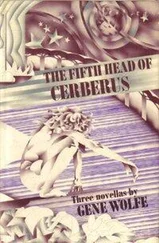I did not know where the baths Dorcas had mentioned stood, though I had surmised from talk I had heard in court that they existed. I did not know where the bazaar where she bought her cloth and cosmetics was located, or even if there were more than one. I knew nothing, in short, beyond what I could see from the embrasure, and the brief route from the Vincula to the archon’s palace. I had, perhaps, a too-ready confidence in my own ability to find my way about in a city so much smaller than Nessus; even so I took the precaution of making certain from time to time, as I trod the crooked streets that straggled down the cliff between cave-houses excavated from the rock and swallow-houses jutting out from it, that I could still see the familiar shape of the bartizan, with its barricaded gate and black gonfalon.
In Nessus the rich live toward the north where the waters of Gyoll are purer, and the poor to the south where they are foul. Here in Thrax that custom no longer held, both because the Acis flowed so swiftly that the excrement of those upstream (who were, of course, but a thousandth part as numerous as those who lived about the northern reaches of Gyoll) hardly affected its flood, and because water taken from above the cataract was conveyed to the public fountains and the homes of the wealthy by aqueducts, so that no reliance had to be put upon the river save when the largest quantities of water — as for manufacturing or wholesale washing — were required.
Thus in Thrax the separation was by elevation. The wealthiest lived on the lowest slopes near the river, within easy reach of the shops and public offices, where a brief walk brought them to piers from which they could travel the length of the city in slave-rowed caiques. Those somewhat less well off had their houses higher, the middle class in general had theirs higher still, and so on until the very poorest dwelt just below the fortifications at the cliff tops, often in jacals of mud and reeds that could be reached only by long ladders.
I was to see something of those miserable hovels, but for the present I remained in the commercial quarter near the water. There the narrow streets were so thronged with people that I at first thought a festival was in progress, or perhaps that the war — which had seemed so remote while I remained in Nessus but had become progressively more immediate as Dorcas and I journeyed north — was now near enough to fill the city with those who fled before it.
Nessus is so extensive that it has, as I have heard said, five buildings for each living inhabitant. In Thrax that ratio is surely reversed, and on that day it seemed to me at times that there must have been fifty for each roof. Too, Nessus is a cosmopolitan city, so that although one saw many foreigners there, and occasionally even cacogens come by ship from other worlds, one was always conscious that they were foreigners, far from their homes. Here the streets swarmed with diverse humanity, but they merely reflected the diverse nature of the mountain setting, so that when I saw, for example, a man whose hat was made from a bird’s pelt with the wings used for ear flaps, or a man in a shaggy coat of kaberu skin, or a man with a tattooed face, I might see a hundred more such tribesmen around the next corner.
These men were eclectics, the descendants of settlers from the south who had mixed their blood with that of the squat, dark autochthons, adopted certain of their customs, and mingled these with still others acquired from the amphitryons farther north and those, in some instances, of even less-known peoples, traders and parochial races.
Many of these eclectics favor knives that are curved — or as they are sometimes called, bent — having two relatively straight sections, with an elbow a little toward the point. This shape is said to make it easier to pierce the heart by stabbing beneath the breastbone; the blades are stiffened with a central rib, are sharpened on both sides, and are kept very sharp; there is no guard, and their hafts are commonly of bone. (I have described these knives in detail because they are as characteristic of the region as anything can be said to be, and because it is from them that Thrax takes another of its names: the City of Crooked Knives. There is also the resemblance of the plan of the city to the blade of such a knife, the curve of the defile corresponding to the curve of the blade, the River Acis to the central rib, Acies Castle to the point, and the Capulus to the line at which the steel vanishes into the haft.)
One of the keepers of the Bear Tower once told me that there is no animal so dangerous or so savage and unmanageable as the hybrid resulting when a fighting dog mounts a she-wolf. We are accustomed to think of the beasts of the forest and mountain as wild, and to think of the men who spring up, as it seems, from their soil as savage. But the truth is that there is a wildness more vicious (as we would know better if we were not so habituated to it) in certain domestic animals, despite their understanding so much human speech and sometimes even speaking a few words; and there is a more profound savagery in men and women whose ancestors have lived in cities and towns since the dawn of humanity. Vodalus, in whose veins flowed the undefiled blood of a thousand exultants — exarchs, ethnarchs, and starosts — was capable of violence unimaginable to the autochthons that stalked the streets of Thrax, naked beneath their huanaco cloaks.
Like the dog-wolves (which I never saw, because they were too vicious to be useful), these eclectics took all that was most cruel and ungovernable from their mixed parentage; as friends or followers they were sullen, disloyal, and contentious; as enemies, fierce, deceitful, and vindictive. So at least I had heard from my subordinates at the Vincula, for eclectics made up more than half the prisoners there.
I have never encountered men whose language, costume, or customs are foreign without speculating on the nature of the women of their race. There is always a connection, since the two are the growths of a single culture, just as the leaves of a tree, which one sees, and the fruit, which one does not see because it is hidden by the leaves, are the growths of a single organism. But the observer who would venture to predict the appearance and flavor of the fruit from the outline of a few leafy boughs seen (as it were) from a distance, must know a great deal about leaves and fruit if he is not to make himself ridiculous.
Warlike men may be born of languishing women, or they may have sisters nearly as strong as themselves and more resolute. And so I, walking among crowds composed largely of these eclectics and the townsmen (who seemed to me not much different from the citizens of Nessus, save that their clothing and their manners were somewhat rougher) found myself speculating on dark-eyed, dark-skinned women, women with glossy black hair as thick as the tails of the skewbald mounts of their brothers, women whose faces I imagined as strong yet delicate, women given to ferocious resistance and swift surrender, women who could be won but not bought — if such women exist in this world.
From their arms I traveled in imagination to the places where they might be found, the lonely huts crouched by mountain springs, the hide yurts standing alone in the high pastures. Soon I was as intoxicated with the thought of the mountains as I had been once, before Master Palaemon had told me the correct location of Thrax, with the idea of the sea. How glorious are they, the immovable idols of Urth, carved with unaccountable tools in a time inconceivably ancient, still lifting above the rim of the world grim heads crowned with mitres, tiaras, and diadems spangled with snow, heads whose eyes are as large as towns, figures whose shoulders are wrapped in forests.
Thus, disguised in the dull jelab of a townsman, I elbowed my way down streets packed with humanity and reeking with the odors of ordure and cookery, with my imagination filled with visions of hanging stone, and crystal streams like carcanets.
Читать дальше










